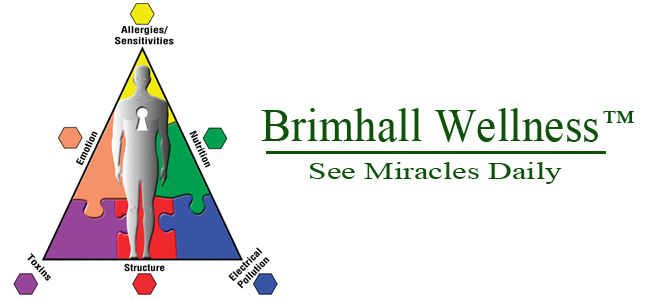
Fat Loss: An Adrenal and Adipose Issue
June 29, 2020 Puzzle Piece
Research
from the study “Adipose Tissue and Adrenal Glands: Novel
Pathophysiological Mechanisms and Clinical Applications” shows that,
“Adipose tissue hormones or ‘adipokines’ have direct effects on the
adrenal glands and interact with adrenal hormones at several levels.
“Here we review the emerging evidence supporting the existence of “cross
talk” between the adrenal gland and adipose tissue, focusing on the
relevance and roles of their respective hormones in health and disease
states including obesity, metabolic syndrome, and primary disorders of
the adrenals.”
Research shows a strong link between the adrenals, how much body fat a
person has and if they are able to shed the excess. The latest research
is zeroing in on adipose tissues and the connection to the adrenal
glands.
Adipose tissues are a heterogeneous group of tissues classified based on
histology and function as white adipose tissue (WAT) and brown adipose
tissue (BAT). The adipose tissues are a source of several hormones
termed “adipokines” or “adipocytokines.”
Researchers from the study said, “Adipokine roles in regulating systemic
energy homeostasis, body weight, vascular biology, inflammation,
glucose and lipid metabolism have been well defined.”
The adrenal cortex produces androgen hormones, all of which decline
substantially with excess stress and age. The most noteworthy hormone is
DHEA. A number of epidemiologic studies have shown correlations between
circulating DHEA-S, obesity, insulin resistance and cardiovascular
disease. DHEA helps prevent the development of new fat cells.
“The dramatic changes in fat distribution characterized by central
adiposity with wasting of subcutaneous fat deposits, typical of Cushing
syndrome, have led to the hypothesis that adrenal exhaustion may play a
role in more common forms of visceral obesity. While circulating
cortisol levels are not increased in obese individuals, increased net
cortisol production occurs locally in the adipose tissue.”
To help with adipose tissue hormone health, you need to take care of the
adrenal glands. In order to do that, it means delivering a highly
potent, bioavailable array of nutrients at the cellular level to allow
for proper adrenal health and function.
Opti-Adrenal: Glandular Care for Your Adipose Tissue Hormones
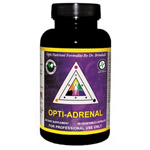
A No. 1-selling Dr. Brimhall formula for years, is a synergistic blend
of whole food nutrients and bioavailable glandulars, providing adrenal
health, function and regeneration.
Opti-Adrenal
contains a therapeutic dose of whole food vitamin C, riboflavin, vitamin
B6, pantothenic acid, and predigested glandulars, along with an array
of other nutrients that support the key players for adrenal health and
function. Together, these nutrients are shown to help your body reduce
cortisol levels, maintain a healthy response to stress, and reduce fat
mass.
More Fat Loss Products for the Complete Package
The essence of weight loss and management is quality calories in and to
burn those calories for energy. The math will not add up if your
mitochondria are not doing their job. Without proper adrenal function,
the food intended for energy burn, will get stored as fat.
Opti-Mito-Force
contains proven nutrients that can revive your mitochondria, which may
be the exact push your body needs to properly burn fat and maintain a
healthy weight. It can accomplish this by helping minimize the stress
effects on the body, mind, emotions, and the mitochondria.
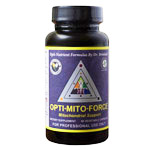
Both an underactive and overactive thyroid can lead to weight
abnormality. The thyroid gland uses iodine from food and supplements to
make the hormone thyroxine (T4), which is converted to the more potent,
bioactive form called triiodothyronine (T3). Thyroid function works in
concert with the pituitary gland, adrenals, parathyroid, and sex glands,
all of which work together to maintain hormonal balance in the body.
Opti-Thyroid
provides tyrosine, iodine, and selenium, along with other
micronutrients that are essential for the production of T4 and its
conversion to T3. B vitamins from a whole food cultured media blend are
present to support energy production, while vitamin C, vitamin E, and
beta-carotene provide support for antioxidant activity and tissue
protection. Chelated minerals, choline, betaine hydrochloride (HCI), and
glutamic acid provide further support for metabolic functions.
Glandular support comes from an Argentinian bovine source and are
predigested to ensure safety, usability, and purity.
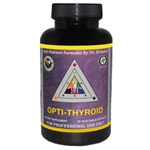
The thyroid needs a minimum of 12.5 mg of iodine daily. Often, we
recommend the addition of Opti-Iodine to give ample iodine and iodide.
Opti-Iodine
provides whole food micronutrients that are essential for the
production of thyroid hormones, providing a foundation that best
supports the thyroid gland. OHS Opti-Iodine
is the only iodine supplement to utilizes predigested whole food
ingredients. You need your thyroid functioning optimally or you run the
risk of your body holding on to excess fat. There is a strong connection
between thyroid function, metabolism and weight loss.
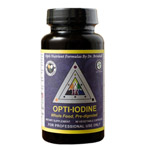
Yours in Health and Wellness,
John W Brimhall, BA, BS, DC, FIAMA
References
- https://www.ncbi.nlm.nih.gov/pmc/articles/PMC4075085/
(Only registered customers can rate)
There are no comments for this product.